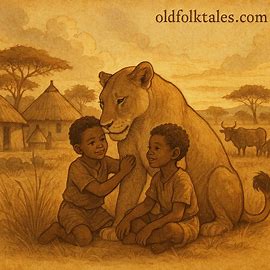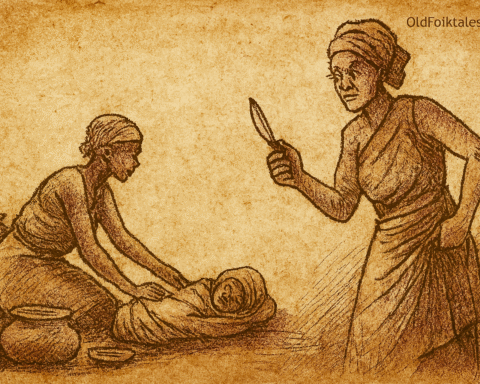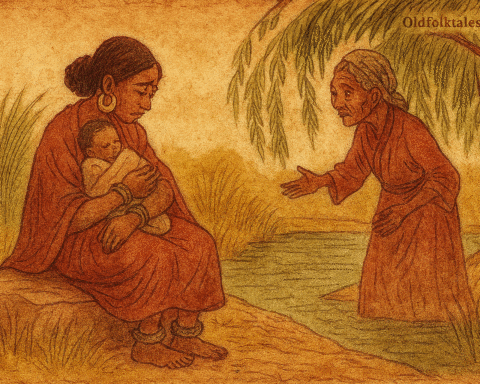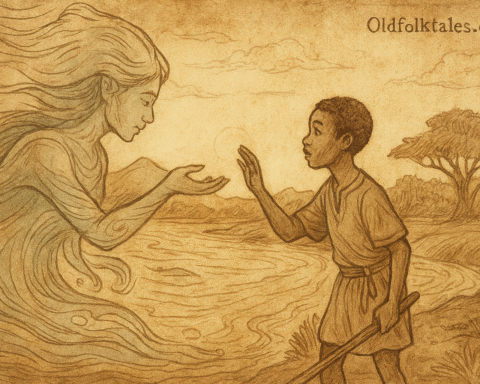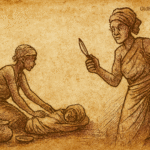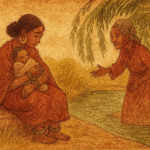Long ago, there lived an old man named Chol, who had two wives. One wife was the daughter of a human being, while the other wife was the daughter of a lion. Both women conceived at the same time, and soon their pregnancies reached their end. The lioness-wife was the first to deliver, giving birth to a son. Shortly after, the human wife also delivered a son, but tragedy struck: she became ill and died soon after childbirth.
Thus only the lioness remained. She had her own son, and she also took in the son of the human wife, raising both boys together as if they were twins. Remarkably, the lioness showed no sign of being a beast. She became like a human mother, gentle, patient, and nurturing. She suckled both children, cared for them, and guided them through every stage of childhood.
The two boys grew side by side. First they crawled, then they weaned from milk, then they learned to walk. Their father Chol lived long enough to see them grow into herders. At first, they tended the sheep and goats. Later, they looked after the calves. Eventually, Chol died suddenly, leaving the brothers in the sole care of the lioness. Yet life went on peacefully. The three of them, lioness mother and two sons, lived happily together.
The lioness never showed any trace of wildness. She was, in every way, the picture of a loving parent. As the years passed, the two brothers matured and were eventually initiated into adulthood. They were known as Deng, the son of the human wife, and Deng, the son of the lioness. Though they shared the same name, they were bound together more tightly than ordinary brothers. Wherever they went, they moved as one.
When the time came for courtship, both sought girl friends. They found them in nearby villages—two girls who, by coincidence, both bore the same name: Achol. The brothers often visited the girls together, never leaving one another behind.
READ: Deng and the Lioness Stepmother: A Dinka Folktale of Betrayal and Survival
One day, Deng of the human mother wished to visit his beloved. He said to his brother, “Brother Deng, I would like to go and see Achol.”
“Very well,” answered Deng of the lioness. “We will go.”
But the human Deng shook his head. “No. It is better if we stop always going together. Someone must remain to watch the cattle. They will be unattended otherwise. Tomorrow, I will tend the cattle while you go to visit your girl friend.”
His brother grew uneasy. “Brother Deng, you should not go alone. I must come with you.”
“Why?” asked the human Deng.
Deng of the lioness confessed his fear. “I have watched our mother. Something has changed in her. It is as though she has developed a hunger for you. I fear for your safety. If you go alone, she may follow you from her hut and harm you. Please, let me come with you.”
But the human Deng dismissed him. “Don’t be foolish. She has raised me as her own since I was a baby. How could she hurt me now?”
The brothers argued until the human Deng insisted. Finally, Deng of the lioness gave in and allowed him to go alone.
That evening, Deng of the human mother set off on his journey. But not long after he left, the lioness stepped out of her hut. She trailed him silently, weaving through the bush beside the road. At last, she leapt out in front of him.
Startled, Deng placed his spears on the ground and sat down. “Mother,” he said, “if you want to eat me, then do so. I will not fight you. How could I kill you, after all your care? If you must kill me, I will not resist.”
The lioness bared her teeth and pressed them playfully against him, saying, “Deng, my son, how could I possibly eat you?” Then she vanished back into the bush, only to reappear suddenly farther ahead.
READ: The Tale of Deng and Deng – Vengeance, Sacrifice, and the War with Lions
Again, Deng laid down his spears. “Come, eat me!” he said. Again, she denied it, slipped back into the shadows, and walked beside him unseen. This pattern repeated until, at last, she returned in a frenzy. With a swift leap, she struck him and tore a gland from his groin. Deng collapsed, bleeding heavily, while the lioness disappeared into the bush with the gland.
Wounded, Deng dragged himself along the road until he reached Achol’s village near midnight. Too late for an ordinary visit, his condition was dire. From outside the hut, he called weakly, “People inside, is Achol there?”
Achol heard his voice and was alarmed. “That sounds like Deng! But why would he come at this hour? Something must be terribly wrong.” She rushed out to find him, bleeding profusely.
She wept, hurried back into the hut, and fetched a fine piece of cotton. She soaked it in water and pressed it against the wound. Then she prepared hot water, gave him a bath, and cared for him tenderly.
Before dawn, Deng insisted on leaving. Achol pleaded, “You cannot walk in this condition. Stay until morning!”
But Deng refused. “I cannot shame you by remaining in your hut to be found here at sunrise. Even if I were dying, I must leave.” Taking a stick to support himself, he limped away into the darkness.
Meanwhile, Deng of the lioness grew worried at his brother’s absence. At daybreak, he seized his spears and prepared to search. Before departing, he warned his mother, “If I find Deng harmed, I will hold you responsible.”
The lioness feigned outrage. “My son, how can you accuse me? Have I not raised him all these years? Why would I harm him now?”
But Deng remained unconvinced. “If I find he has suffered, you will answer for it.”
Then he left, determined to find his brother. CLICK TO READ PART TWO IMMEDIATELY
Moral Lessons
This first part of the tale teaches that love can go beyond nature and blood. The lioness, though born of the wild, raised two boys with the tenderness of a true mother, showing that care defines family more than origin. Yet it also warns us that even the most trusted bonds can shift with time, for her heart eventually turned against the child she once nurtured. The story shows the importance of listening to wise caution, as the human Deng’s refusal to heed his brother’s warning nearly cost him his life. At the same time, his determination to protect the honor of his beloved Achol, even while bleeding from a mortal wound, reveals that dignity and respect can matter more than personal safety. Above all, the closeness of the two brothers reminds us that unity between siblings can serve as the strongest shield in a world filled with dangers.
Knowledge Check
Q1: Who was Chol, and why is he important in the story?
A1: Chol was the father of both boys, married to a human wife and a lioness wife. His marriages created the unique family at the heart of the tale.
Q2: How were the two sons raised after their human mother died?
A2: The lioness raised both boys—her own child and the human wife’s child, nurturing them as twins with equal love.
Q3: What role did the lioness play in their upbringing?
A3: She became a devoted mother figure, teaching them, suckling them, and guiding them until they reached manhood.
Q4: Why did Deng of the lioness try to stop his brother from visiting Achol alone?
A4: He sensed a dangerous change in his mother’s behavior and feared she might harm his human brother.
Q5: How did Deng of the human mother respond to his brother’s warning?
A5: He dismissed the warning, trusting the lioness because she had raised him lovingly from infancy.
Q6: What tragic event occurred on Deng’s journey to Achol’s home?
A6: The lioness attack
